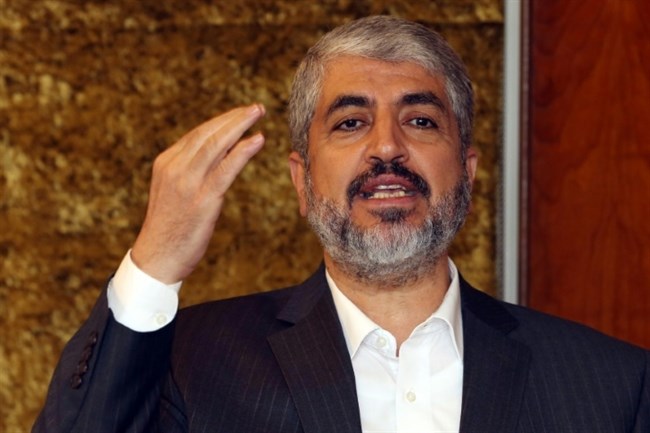In a speech delivered Saturday night in Qatar, Hamas politburo chief Khalid Mashaal admitted that Hamas “made mistakes” after winning elections in 2006 that led the party’s rule over the Gaza Strip, and also hinted that he would not run for reelection in Hamas’ internal elections expected to be held next year.
“The experience has proved that winning a majority in the ballots is important, but not important enough to abandon maintaining partnerships in national unity or undertake the decision-making process alone,” Mashaal said, in a rare open acknowledgement of how Hamas handled tensions that arose with the Fatah-led Palestinian Authority (PA) since Hamas’ rise to power in the Gaza Strip a decade ago.
Mashaal delivered his speech at a symposium organized by the Al Jazeera Center for Studies, a think tank affiliated to the Al Jazeera Media Network.
“It has also been proven that if you receive a negative response from a partner after you offer partnership, you shouldn’t just give up on them,” he added, referring to the years of failed reconciliation efforts between Hamas and Fatah since 2006.
“When we won elections, we offered partnership to other Palestinian forces, but it later became clear they aimed to place us on the margins to justify targeting us at international and regional levels.”
“I say it very honestly, as chief of the movement, that we found it easy to rule alone. However, I put ‘rule’ between quotation marks because there isn’t real governance in Palestine, but rather a political experiment.”
He said that the PA could not be treated as a state or a legitimate authority, and instead described it as “a pattern of authority which was imposed on us since the Oslo Accords. We chose to participate in that so as to compete, defend, reform, serve our people, and protect the (Palestinian) resistance.”
He went on the make a distinction between Hamas as an Islamist group and others Islamist movements which came to be in the wake of the Arab Spring.
“Hamas, as a form of Palestinian resistance, does not follow the same pattern of other Islamist resistance movements which were active during the Arab Spring revolutions or anti-revolutions, because Hamas is originally a resistance movement — or a national liberation movement — whose fundamental struggle is against the Zionist occupation of the land of Palestine.
“However, the movement undoubtedly has a political face and a political Islamist thought.”
When asked about rumors which have been circulating over his intention not to run for reelection as chief of Hamas’ politburo after serving in this position for 20 years, Mashaal said: “Just as (Deputy Hamas leader) Ismail Haniyeh is a former prime minister — which is something to be reckoned with in the Palestinian experience — Khaled Mashaal will become the former chief of the Hamas politburo next year, and this is also something to be reckoned on as an advantage for Hamas.”
Hamas official Ahmad Youssef said in an interview with Ma’an on Tuesday that the movement was planning on holding internal elections during the first half of 2017, following the cancellation of Palestinian municipal elections by the PA-controlled Supreme Court, which were set to be held in the occupied West Bank and Gaza Strip in October.
Youssef said that after internal elections for each area were completed, Hamas would gather to elect a new head for the politburo.
However, he said that it was “too soon to expect who would be head of the politburo following Khalid Mashaal.”
Hamas holds internal elections every four years.
Meanwhile, the Palestinian Supreme Court postponed on Monday a decision regarding future municipal elections to Oct. 3, following a request by the public prosecution. The last elections in the Gaza Strip were held in 2006, when Hamas’ victory led to a violent conflict between Hamas and Fatah, as both groups attempted to take control of the besieged coastal enclave.
Gaza was placed under an Israeli military siege in 2007 following Hamas’ victory in the general elections and subsequent takeover of the government. The nearly decade-long siege has severely crippled the economy and further isolated the Gaza Strip from the rest of the Palestinian territory.
The two parties reached a reconciliation agreement in 2014, but its practical implementation was met with failure as a result of Hamas’ wariness at relinquishing control of the Gaza Strip and numerous political disagreements between the two groups.
[Source: Ma’an]





 WhatsApp us
WhatsApp us 

